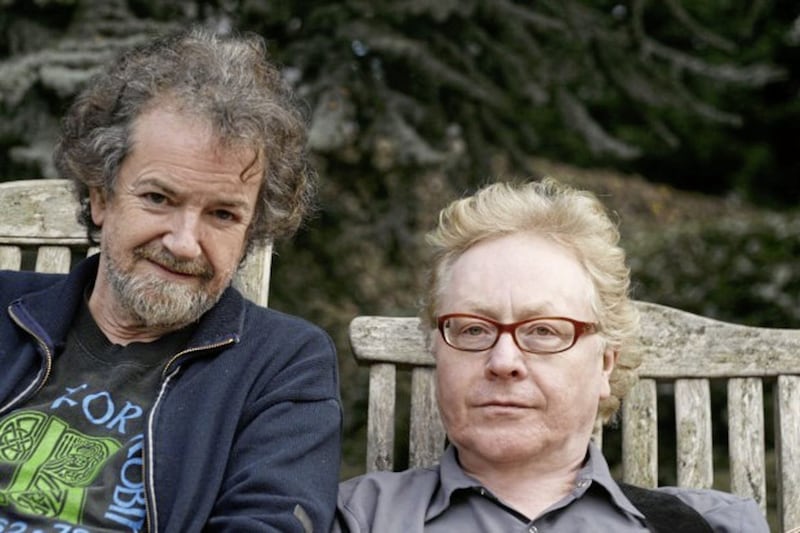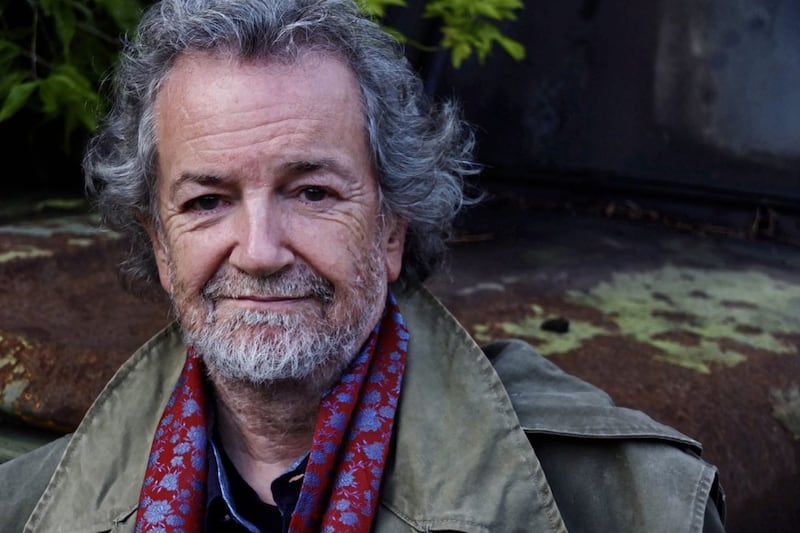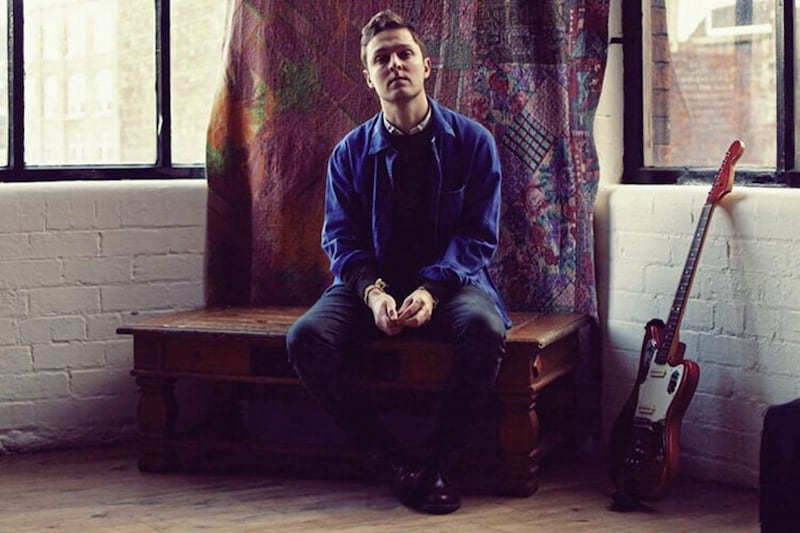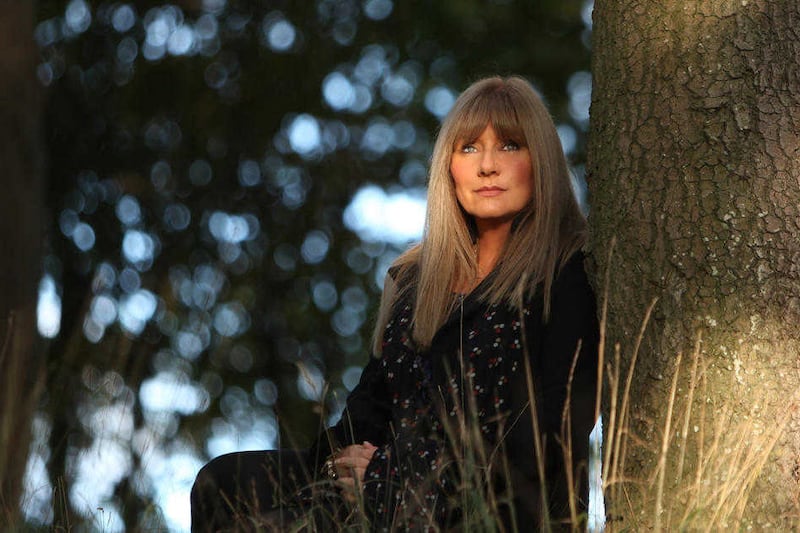THE boys are back in town. Yes, Andy Irvine and Paul Brady are heading to Belfast's Waterfront Hall on October 25, to again celebrate their eponymous classic of Irish folk song and music.
In the same way that nearly every household in the free world had The Eagles Greatest Hits, Bridge Over Troubled Waters and, er, Tubular Bells in their LP collection during the 1970s, folk fans had the ginger mop of Brady and the toussle-haired and bearded Irvine look out at them from the famous blue cover with a “wait till yez hear this” look about them.
Indeed, the pair had created new clothing for the Irish repertoire, taking classics like The Streets of Derry, Mary and the Soldier and, of course, Arthur McBride, turning them into something that chimed with the mood of the nation as it was back then.
In May 2017 the duo decided, due to the album's still immense popularity, to do an Irish tour of live shows marking the 40th anniversary of its release. So successful was it that it was repeated in 2018, taking it to sold-out events in Ireland, London and Prague with other performances planned for 2020.
However, a certain pandemic got in the way but 44 years since it first came out audiences are still hooked on the fabulous songs, beautifully adapted and passionately performed; so much so that, by popular demand, Aiken Promotions have just announced that the duo's performances which had been planned for March 2021 in the Waterfront Hall in Belfast and in Vicar Street in Dublin are now being rescheduled to October. They’ve even added an extra date at the Cork Opera House.
The show features songs and tunes from the album and many other musical masterpieces that Andy and Paul have performed throughout both of their illustrious careers and, as on the previous tours, they will be accompanied by Dónal Lunny and Kevin Burke, both of whom were players on the original album recording, with Dónal also producing the record.
Tickets for the Waterfront gig cost £38 and are now on sale from waterfront.co.uk or you can call the Box office at (028) 90 334455.
The revised dates are Cork Opera House – Sunday, October 17 2021; Vicar Street, October 21 and 22 and the Waterfront Hall, Tuesday October 25 2021.
Original Tickets remain valid for the new shows.
:: Congratulations go out to harpist Fionnuala Donlon and piper Colm Broderick, who have won won the Seán Ó Riada Gold Medal in the final of the competition which was broadcast live on RTÉ Raidió na Gaeltachta last weekend.
Each year the competition focuses on different instruments and this year the focus was on uilleann pipes and harp. Judges for the competition were Mick O'Brien, Laoise Kelly and Michelle Mulcahy, and the winners were awarded the Gold Medal and €2,500 each. Peadar Ó Riada presented the final live from Baile Bhúirne on Raidió na Gaeltachta’s Cuireadh Chun Ceoil programme.
Sadly, no audience was present this year due to public health restrictions, but the championship was streamed live online.
Fionnuala (22) is from Dundalk, Co Louth, and began playing the harp when she was nine years old. She is currently a substitute teacher at St Brigid's School in Dundalk, teaching children with special needs.
She also teaches music in various locations, including Maynooth University. Colm Broderick (22) is from Graiguecullen in Carlow. He is a student teacher and is currently in his third year at Mary Immaculate College.
Colm is also a music teacher and hopes to teach at the Willie Clancy Virtual Summer School in a few months.
Na Píobairí Uilleann recently presented Colm with a set of pipes made by the great Leo Rowsome for piper Sean Reid in 1936. They were also once owned by Willie Clancy and Liam O’Flynn so Colm is particularly proud that he won the gold medal on that set of pipes.
The medal was designed by the late goldsmith Pádraig Ó Mathúna of Cashel in Co Tipperary.
On one side of the base is a portrait of Seán Ó Riada, and on the other is an engraved image based on Dán Aimhirgín/The Song of Aimhirgín which was allegedly spoken by the Milesian poet Aimhirgín Glúngel, who is said to have recited it on first setting foot in Ireland.
The medal is made of silver, and after the competition the winner's name is engraved on it and dipped in gold.
:: There is at last some hope in the air that the musical life of the country is about to bloom again – with all the usual caveats, a global pandemic added to the great unknowns of music making – unsure funding, lack of venues, fickle audiences, the stresses of touring.
Some of the signs are really positive and others not so. Speaking to Conor Byrne – a nephew of Christy Moore and Luka Bloom – he tells me that the The Doolin Folkfest in Co Clare is happening again this September and, holy guacamole, it's already sold out!
Conor's also organising Scoil Gheimhridh Ghaoth Dobhair in Gweedore from December 27 2021- January 1 2022 while the RTÉ 1 Folk Awards are happening in October.
Fleadh Cheoil na hÉireann – the largest of the annual Irish traditional music festivals – was meant to take place in Mullingar in 2020 and 2021 but it is coming to the Westmeath town in August 2022.
:: I can’t let this column go without paying tribute to Irish language activist Albert Fry who died last week in his 80th year. Tributes have already been paid to Albert as a teacher of Irish but his contribution as a song collector isn’t given its due recognition.
Spending a lot of his youth in the 1950s and 1960s visiting Rann na Feirste in the Donegal Gaeltacht in the company of Máirtín Mac Grianna – a scion of the great literary dynasty – the pair would visit houses where singing and storytelling was still part of a vibrant culture.
Albert gathered up the songs he heard and brought them back to Belfast where he shared them with audiences at Cumann Chluain Ard, the Irish language and cultural centre in Hawthorn Street in the west of the city.
In that way, songs from 18th century Irish poets and modern “songs of the people” made the journey from the cottages of Donegal to the back streets of Belfast where they were avidly taken up by a new generation of Irish speakers and singers.
Albert made three albums – Maidin Luan Cincíse (1969), Thiar i dTír Chonaill (1976) and Albert Fry (1983) – and among those appearing on his albums were Dónal Lunny, Máiréad Ní Mhaonaigh and the late Frankie Kennedy.
He could silence the noisiest of audiences in the rowdiest of bars with a voice that was ethereal at times, giving passion and meaning to Gaelic lyrics which had their own innate beauty.
Ar dheis Dé go raibh a anam dílis.






